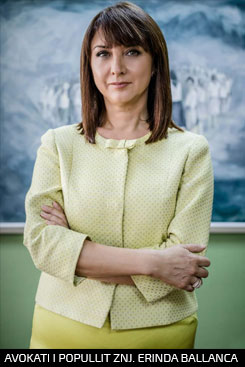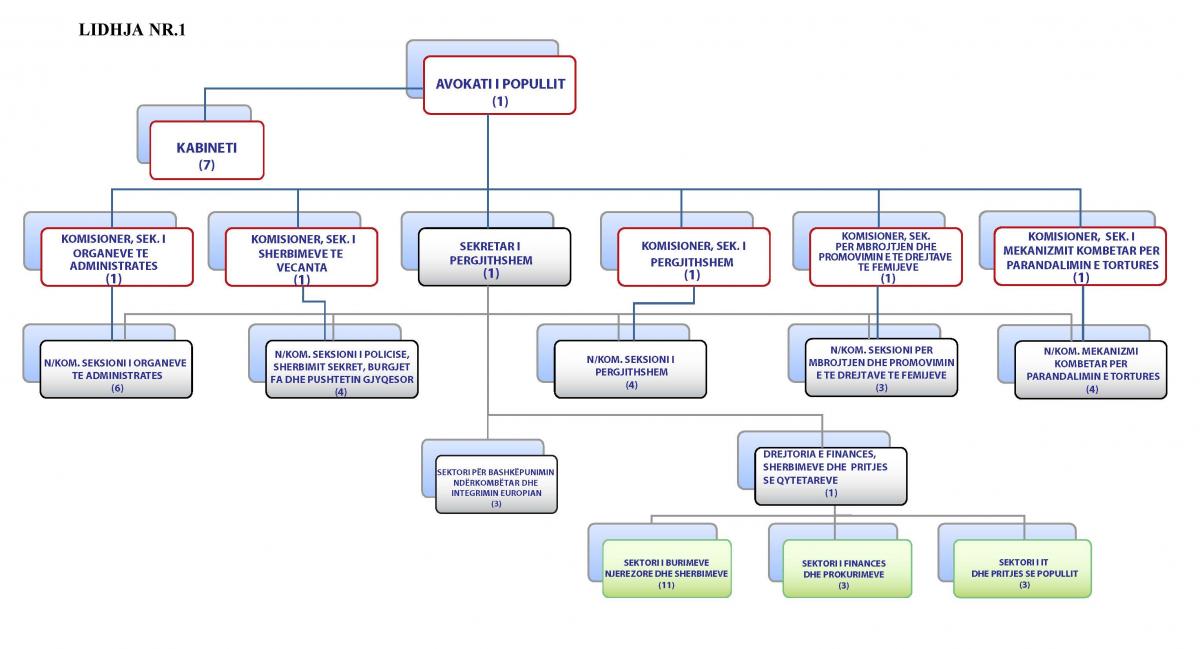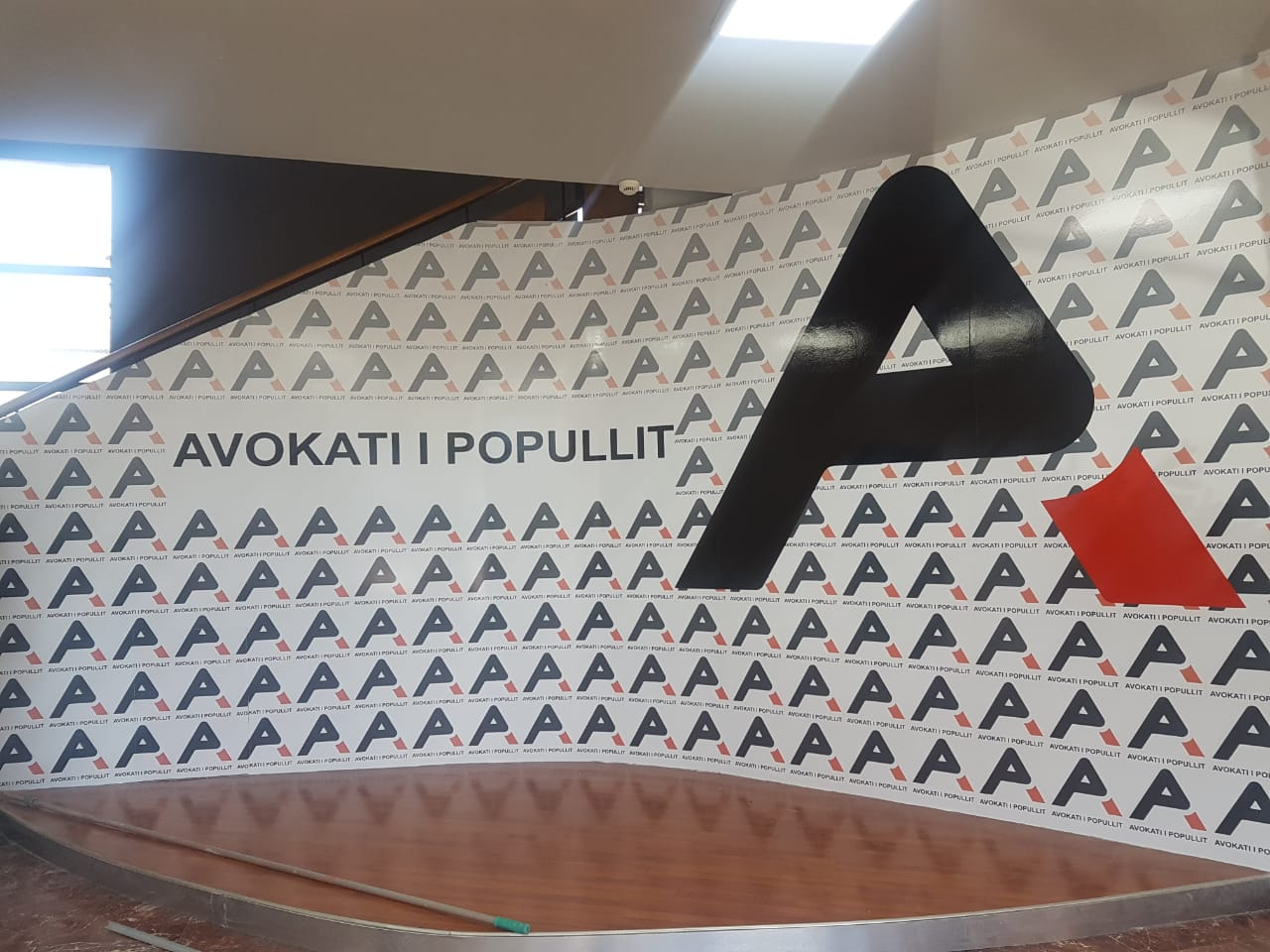-
About Us
-
Ombudsman
-
History
-
Structure
-
Archives
-
About Us
The People’s Advocate (Ombudsman) Institution is provided for the first time in the Albanian Constitution adopted in November 1998, while the Law No. 8454 'On the People’s Advocate Institution' (amended later on) was firstly adopted by the Albanian Parliament in February, 4. 1999. This law is designed to take into consideration the legislation of other countries of Europe, which have previously created such an institution. The direction of the People's Advocate is a monocratic one. The Ombudsman is elected by a three-fifths majority of all members of the Assembly for a period of 5 years with the right of reelection.
People's Advocate (Ombudsman) defends the rights, freedoms and lawful interests of individuals from unlawful and incorrect acts or omissions of public administration bodies as well as third parties acting on its behalf. It has as its mission the prevention of potential conflicts between public administration and the individual. Ombudsman acts on the basis of the complaint or request submitted to his office. He also operates on his own initiative, for special occasions made public, but further must take the consent of the person concerned or the injured.
In cases where the Ombudsman begins the procedure for examining the case on his own initiative and when the guardian or legal representative of the injured party does not act, Ombudsman does not require the consent of the victim when the last is a minor, mentally incapacitated or disabled, or when at stake is protection of the rights of a large number of individuals.
In defense of the interests of a wider community which may be affected by the administrative proceeding, the Ombudsman has the right to initiate an administrative proceeding and participate in it in accordance with the requirements of the Administrative Procedure Code.
It’s not the Ombudsman who decides directly himself to restitute the rights of petitioners, but he makes recommendations to remedy the violation of the right by a public administration body which has caused the violation. In cases where the relevant body does not respond to the recommendations of the Ombudsman, the latter may address gradually to higher bodies in hierarchy up to the Assembly (Parliament) with a report proposing concrete measures for restitution of the violated right.
There are outside the Ombudsman's jurisdiction the acts and persons as following:- President of the Republic
- Chairman of the Council of Ministers
- Military orders of the Armed Forces
- Civil conflicts where the public administration bodies are not party (civil relationships between private or commercial individuals).
The Ombudsman may not start or, if started, can terminate the investigation if the same case has been decided or is being examined by the prosecution office or the court. In these cases the Ombudsman has the right to request information from those authorities. He has the right to request information or documents related to the matter under consideration, even if they are classified as state secrets.
-
Personal biography


Mr. Endrit Shabani is a lawyer with a rich academic career focused on public law and human rights. He completed his Master's studies and defended his 'Doctor of Science' (PhD) degree at the University of Oxford.
For 15 years, he has worked as a law lecturer at universities in Albania, France and the United Kingdom
He has also served as a consultant for important international organizations, including Transparency International, the United Nations and the Council of Europe.
Mr. Shabani has been a civil society activist, leader of the Youth Parliament, chairman of the 'Nisma Thurje' and member of the Tirana Municipal Council.
On 18 December 2025, Mr. Endrit Shabani was elected by the Albanian Parliament to the position of People's Advocate of the Republic of Albania for a five-year term.
-
History
From a retrospective of all activity for the establishment and development of the People's Advocate Institution, it turns out that rapid progress and success in increasing public confidence have made a positive impression to both internal factor and the international one.
It must be said that social trauma that occurred in Albania during the first 10 years of transition (1991-2000) due to the change of political system, could not be managed responsibly by the traditional institutions of the state. Police, military, courts and other structures that define the existence of the state, in 1997, for a short time, in no small part of the territory of the state fell into total collapse. Since that moment it was proved that the international community, present and influential in Albania since the beginning of the democratic process, after 1997 implemented a different strategy, so as the development programs for the establishment and strengthening of new democratic institutions of the Albanian state.
Albania's new constitution was approved by referendum in 1998 as a contribution of local experts, as well as the international ones. In this new constitution was envisaged intention to create a new institution of Ombudsman. In February 1999 the Albanian Parliament approved the relevant law with 40 articles 'On the People’s Advocate', which is a combination of the Danish and the Swedish Ombudsman laws.
People’s Advocate in AlbaniaThe first process of selecting the People’s Advocate (Ombudsman) was conducted by the Albanian Parliament on 16 February 2000. The Constitution requires that the Ombudsman is elected by no less than 3/5 of all deputies. Albanian Parliament entrusted the task for the first time to Mr. Ermir Dobjani who was re-elected in February 2005 for a second term up to 16 February 2010.
From 16 February 2010 until 4 November 2010, the Ombudsman function was performed by Mr. Riza Poda, and from that date until 22 December 2011, the task of head was performed by Ms. Florina Nuni.
Besides the Ombudsman, by the latest proposal, the Albanian Parliament has elected or re-elected respectively the Commissioners of the People’s Advocate, namely: Mr. Agron Çaushi (2000-2003); Mr. Jorgo Dhrami (2000-2003 and 2004-2007); Ms. Florina Nuni (2000-2003, 2007-2010 and 2010-2013); Mr. Riza Poda (2004-2007 and 2007-2010); Mr. Skender Haluca (2007-2010); Ms. Anila Nepravishta (2010-2013); Mr. Arben Shkembi (2010-2013 and 2014-2017); Ms. Etilda Gjonaj (2014-2017); Mr. Ermir Kapedani (2014-2017).
On 22 December 2011, the Albanian Parliament with 127 votes of deputies present elected Mr. Igli Totozani in the position of the People’s Advocate.
The mandate of Mr. Igli Totozani ended in 2017 and on May 22 of the same year, the Parliament of Albania elected with an overwhelming majority of 114 votes as the new Ombudsperson, Ms. Erinda Ballanca.
The mandate of Ms. Erinda Ballanca ended in 2022, which continued until 2025, and on December 18, 2025, the Albanian Parliament elected Mr. Endrit Shabani as Ombudsman with a majority of 85 votes
-
Structure

LIDHJA NR.2
Emërtimi i funksionit
Numri i Punonjësve
(56)
Kategoria/Klasa
Avokati i Popullit
1
Ligji nr. 8454, datë 04.02.1999, i ndryshuar
Kabineti
-Drejtor Kabineti
-Këshilltar
-Sekretar
7
1
5
1
VKM nr. 187, datë 08.03.2017, i ndryshuar
I-b
VKM nr. 187, datë 08.03.2017, i ndryshuar
- Sekretar i Përgjithshëm
1
I-a
Seksioni për organet e administratës qendrore, të pushtetit vendor dhe të të tretëve që veprojnë për llogari të tyre
- Komisioner
- Ndihmëskomisioner
- Ndihmëskomisioner
7
1
4
2
Ligji nr. 8454, datë 4.2.1999, i ndryshuar
II-a
II-b
Seksioni për policinë, shërbimin sekret, burgjet, Forcat e Armatosura dhe pushtetin gjyqësor
- Komisioner
- Ndihmëskomisioner
- Ndihmëskomisioner
5
1
3
1
Ligji nr. 8454, datë 4.2.1999, i ndryshuar
II-a
II-b
Seksioni i Përgjithshëm
- Komisioner
- Ndihmëskomisioner
- Ndihmëskomisioner
5
1
3
1
Ligji nr. 8454, datë 4.2.1999, i ndryshuar
II-a
II-b
Seksioni për mbrojtjen dhe promovimin e të drejtave të fëmijëve
- Komisioner
- Ndihmëskomisioner
- Ndihmëskomisioner
4
1
2
1
Ligji nr. 8454, datë 4.2.1999,
i ndryshuar
II-a
II-b
Mekanizimi për parandalimin e torturës, trajtimit ose dënimit të egër, çnjerëzor ose poshtërues
- Komisioner
- Ndihmëskomisioner
- Ndihmëskomisioner
5
1
2
2
Ligji nr. 8454, datë 4.2.1999, i ndryshuar
II-a
II-b
Drejtoria e Financës, Shërbimeve dhe Pritjes së Qytetarëve
- Drejtor
Sektori i Burimeve Njerëzore dhe Shërbimeve
- Përgjegjës Sektori
- Specialist për Burimet Njerëzore
- Specialist Protokolli
- Arkivist/Bibliotekar
- Magazinier
- Shofer i titullarit
- Shofer
- Teknik i mesëm i specialiteteve të ndryshme
- Punëtor pastrimi
Sektori i Financës dhe Prokurimeve
-Përgjegjës Sektori
-Specialist i Financës
-Specialist i Prokurimeve
Sektori i IT dhe Pritjes së Qytetarëve
- Përgjegjës sektori
- Specialist i Shërbimeve ndaj Qytetarit
18
1
1
1
1
1
1
1
2
1
2
1
1
1
1
2
II-b
III-a
III-b
III-b
Klasa VIII
Klasa VI
Klasa VI
Klasa IV
Klasa VI
Klasa I
III-a
III-b
III-b
III-a
III-b
- Sektori për bashkëpunimin ndërkombëtar dhe integrimin evropian
- Përgjegjës Sektori
- Specialist
3
1
2
III-a
III-b
-
Archives
Institucioni i Avokatit të Popullit mbron të drejtat, liritë dhe interesat e ligjshme të individit nga veprimet ose mosveprimet e paligjshme e të parregullta të organeve të administratës publike, si dhe të tretëve që veprojnë për llogari të saj. Ai ka si mision të tij parandalimin e konflikteve të mundshme midis administratës publike dhe individit. Avokati i Popullit vepron në bazë të ankesës apo kërkesës së paraqitur pranë tij. Ai vepron edhe me nismën e vet, për raste të veçanta, të bëra publike, por gjithmonë duhet të marrë më vonë pëlqimin e të interesuarit ose të dëmtuarit.
Në rastet kur Avokati i Popullit fillon proçedurën e shqyrtimit të çështjes me nismën e vet dhe kur kujdestari ose përfaqësuesi i tij ligjor nuk vepron, nuk kërkohet pëlqimi i të dëmtuarit kur është i mitur apo i paaftë mendërisht apo me aftësi të kufizuara ose për mbrojtjen e të drejtave të një numri të madh të individëve.
Në mbrojtje të interesave të një komuniteti të gjërë, të cilët mund të preken nga proçedimi administrativ, Avokati i Popullit ka të drejtë të fillojë një procedim administrativ dhe të marrë pjesë në të, në përputhje me kërkesat e Kodit të Procedurës Administrative.
Avokati i Popullit nuk vendos direkt vetë për t’ju dhënë të drejtat personit që ankohet, por bën rekomandime për vënien në vend të së drejtës së shkelur tek organi i administratës publike që sipas tij ka shkaktuar shkeljen e saj. Në rastet kur organi përkatës nuk reagon ndaj rekomandimeve të Avokatit të Popullit, ky i fundit mund t’i drejtohet shkallë-shkallë organeve më të larta në hierarki, deri edhe Kuvendit (Parlamentit) me një raport, duke propozuar edhe masa konkrete për vënien në vend të së drejtës së shkelur.
Janë jashtë juridiksionit të Avokati i Popullit personat dhe aktet e mëposhtme:
- Presidenti i Republikës
- Kryetari i Këshillit të Ministrave
- Urdhërat me karakter ushtarak të Forcave të Armatosura
- Konfliktet civile ku nuk janë palë organet e administratës publike (marrëdhëniet civile ndërmjet personave privatë ose tregtarë).
Nga një vështrim retrospektiv i të gjithë veprimtarisë për ngritjen dhe zhvillimin e Institucionit të Avokatit të Popullit, rezulton se progresi i tij i shpejtë dhe suksesi në rritjen e besimit të publikut kanë bërë përshtypje pozitive, si tek faktori i brendshëm, ashtu edhe ai ndërkombëtar.
Traumat sociale që ndodhën në Shqipëri, gjatë 10 viteve të parë të tranzicionit, (1991-2000) si pasojë e ndryshimit te sistemit politik, duhet thënë, nuk mundën të menaxhoheshin me përgjegjshmëri nga institucionet tradicionale të shtetit. Policia, ushtria, gjykatat dhe struktura të tjera që përcaktojnë ekzistencën e shtetit, në vitin 1997, për një kohë të shkurtër, në një pjesë jo të vogël të territorit të shtetit ranë në kolaps të plotë. Që nga ky moment u dëshmua se edhe komuniteti nderkombetar, i pranishëm dhe me ndikim të madh në Shqipëri, që në fillimet e proceseve demokratike, pas vitit 1997 zbatoi një strategji tjetër, atë të programeve të zhvillimit për ngritjen dhe forcimin e institucioneve të reja demokratike të shtetit shqiptar.
Kushtetuta e re shqiptare që u aprovua me referendum në vitin 1998 është një kontribut sa i ekspertëve vendas, aq edhe atyre ndërkombëtarë. Në këtë Kushtetutë të re u parashikua krijimi i institucionit të ri të Avokatit te Popullit. Në shkurt të vitit 1999 Parlamenti shqiptar miratoi edhe ligjin përkatës me 40 nene “Për Avokatin e Popullit”, i cili është një kombinim midis ligjit Danez dhe atij Suedez.
Avokati i Popullit në Shqipëri.
Procesi i parë i zgjedhjes së Avokatit të Popullit u zhvillua nga Parlamenti shqiptar më 16 shkurt 2000. Kushtetuta kërkon që Avokati i Popullit të zgjidhet me jo më pak se 3/5 të të gjithë deputetëve. Kuvendi i Shqipërisë, këtë detyrë ia besoi për herë të parë z. Ermir Dobjani, i cili u rizgjodh në shkurt 2005 edhe për një mandat të dytë, deri në 16 shkurt të vitit 2010.
10 Vjet Avokati i Popullit në Shqipëri
Nga data 16 Shkurt 2010 deri me 4 Nentor 2010, funksionin e Avokatit të Popullit në Detyre e kreu z. Riza Poda, ndërsa nga kjo datë e deri ne daten 22 Dhjetor 2011, këtë detyrë e kreu zj. Florina Nuni.
Krahas Avokatit të Popullit, me propozim të ketij të fundit, Parlamenti shqiptar, ka zgjedhur apo rizgjedhur perkatesisht mandateve, edhe komisioneret e Avokatit të Popullit, dhe konkretisht: z. Agron Çaushi (2000-2003); z. Jorgo Dhrami (2000-2003 dhe 2004-2007); zj. Florina Nuni(2000-2003, 2007-2010 dhe 2010-2013); z. Riza Poda (2004-2007 dhe 2007-2010); z. Skender Haluca (2007-2010); zj. Anila Nepravishta(2010-2013); z. Arben Shkëmbi (2010-2013).
Në datën 22 Dhjetor 2011, Kuvendi i Shqipërisë, me 127 vota Pro të deputetëve të pranishëm, zgjodhi z. Igli Totozani në detyrën e Avokatit të Popullit.


